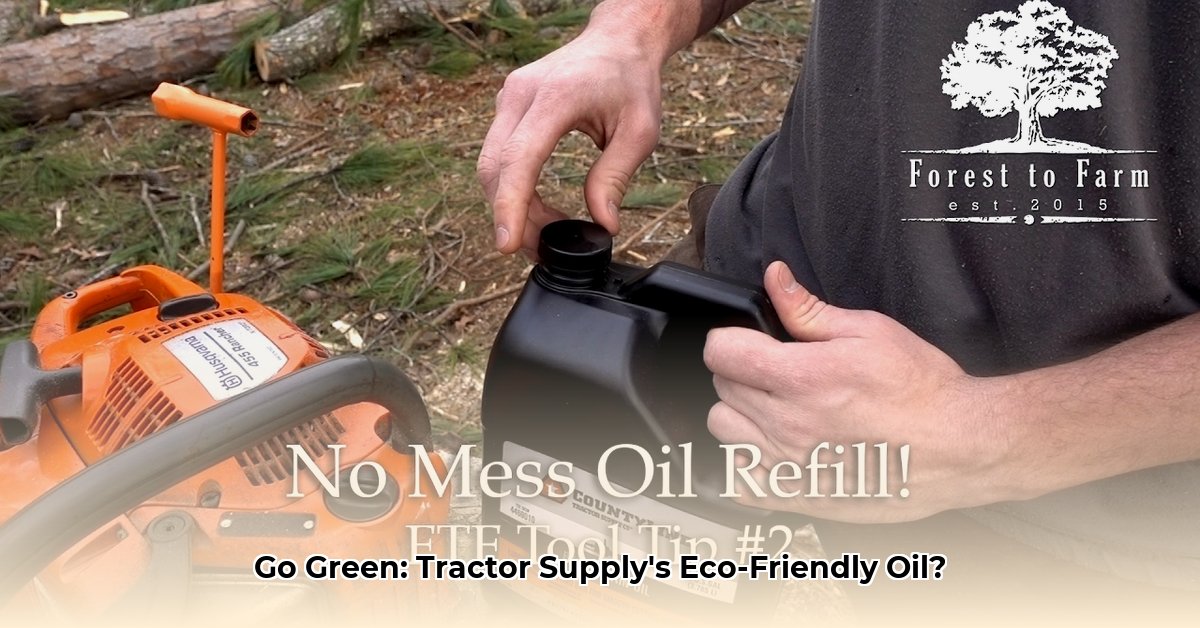
Tractor Supply Bar and Chain Oil: A Greener Approach to Farming
Maintaining farm equipment is crucial, but the environmental impact of bar and chain oil often goes overlooked. Traditional petroleum-based oils persist in the environment, causing pollution and contributing to greenhouse gas emissions. However, sustainable alternatives are emerging, offering comparable performance with significantly reduced ecological impact. This article explores these options, guiding farmers toward informed choices for a greener future. We'll examine the environmental consequences of conventional oils, showcase sustainable alternatives available at Tractor Supply, and provide a practical guide for selecting, handling, and disposing of bar and chain oil responsibly. For more on responsible waste management, check out Tractor Supply resources
The Environmental Impact of Traditional Bar and Chain Oils
Conventional petroleum-based bar and chain oils pose significant environmental challenges. Their slow biodegradability leads to soil and water contamination, harming ecosystems and potentially affecting crop yields. Furthermore, the manufacturing process and transportation of these oils contribute substantially to greenhouse gas emissions, exacerbating climate change. Recent studies show that petroleum-based oils can remain in the environment for years, slowly leaching harmful substances into the soil. This poses a significant threat to biodiversity and overall environmental health.
Sustainable Alternatives: Bio-Based Bar and Chain Oils
Fortunately, bio-based bar and chain oils offer a compelling alternative. These oils, derived from renewable resources like plants, are designed to biodegrade rapidly in the environment, minimizing pollution. Many perform equally well or even better than their petroleum-based counterparts, offering a viable, environmentally conscious choice. "Biodegradability" refers to how quickly the oil decomposes naturally, and higher ratings indicate a lower environmental burden. The benefits extend beyond reduced pollution; their renewable origin also contributes to a smaller carbon footprint. However, it’s crucial to compare prices carefully, as environmental benefits often come with a higher initial cost that may be offset by long-term savings and reduced equipment maintenance.
Choosing the Right Oil: A Practical Guide for Sustainable Farming
Selecting the optimal bar and chain oil involves considering several factors:
Climate: Extreme temperatures affect oil viscosity (thickness). Thinner oils (lower SAE numbers like SAE 30) are preferable in hot climates, whereas thicker oils (higher SAE numbers like SAE 40 or 50) perform better in cold conditions. All-season SAE 40 oils often provide a good balance.
Equipment Type: High-powered chainsaws require oils formulated to withstand heat and stress, while smaller equipment may tolerate less specialized oils. Always consult your equipment's manual for recommended specifications.
Budget: While bio-based oils might have a higher initial cost, their reduced environmental impact and potential for increased equipment lifespan can yield long-term cost savings.
Biodegradability: Prioritize oils with high biodegradability ratings, clearly indicated on product labels or available through online resources. This is a key indicator that the oil will decompose rapidly, minimizing its environmental impact.
A Decision-Making Framework:
- Assess your needs: Consider equipment type, climate, and operational demands.
- Research options: Compare biodegradability ratings, performance characteristics, and cost-effectiveness.
- Read reviews: Research the experiences of other farmers with various oils.
- Make an informed decision: Select the best oil that balances performance, budget, and environmental responsibility.
Responsible Oil Handling and Disposal: Minimizing Environmental Impact
Even with biodegradable oils, responsible handling and disposal are critical. Always store oil in tightly sealed containers, away from heat sources. When disposing of used oil, never pour it down drains or onto the ground. Consult local regulations; many regions offer recycling programs specifically for used motor oils, including bar and chain oil.
Long-Term Sustainability Strategies: Beyond Oil Selection
Reducing oil consumption is a key element of sustainable farming. Regular maintenance, including sharpening saw chains and performing timely repairs, significantly reduces the frequency of oil changes. This also minimizes equipment wear, leading to both environmental and financial benefits. Investing in fuel-efficient equipment can further enhance your farm's sustainability efforts.
Conclusion: Embracing Sustainable Farming Practices
Selecting eco-friendly bar and chain oil is a simple yet significant step toward environmentally responsible farming. By making informed choices, you contribute to a healthier environment while maintaining productive farm operations. Embrace sustainable practices as an ongoing effort; every small change contributes to a larger positive impact on your farm and the planet.